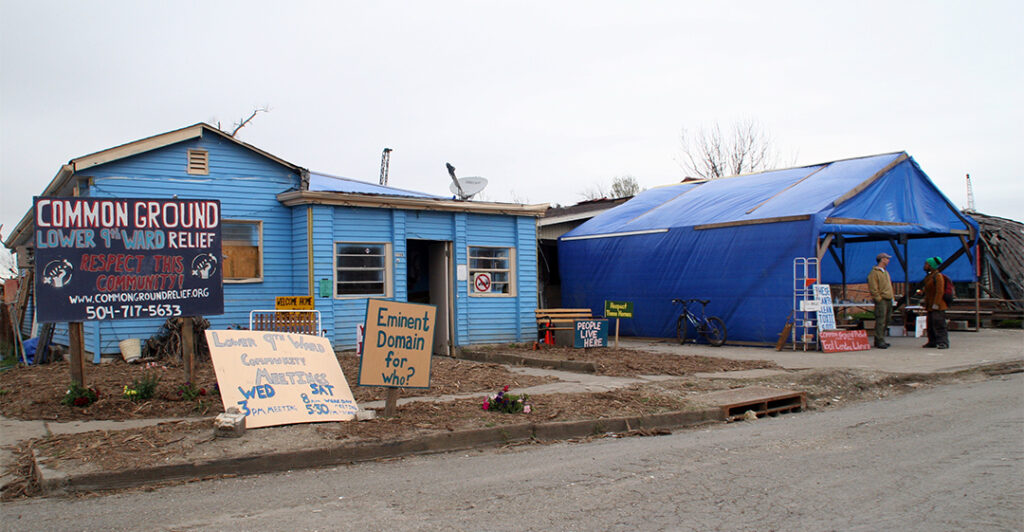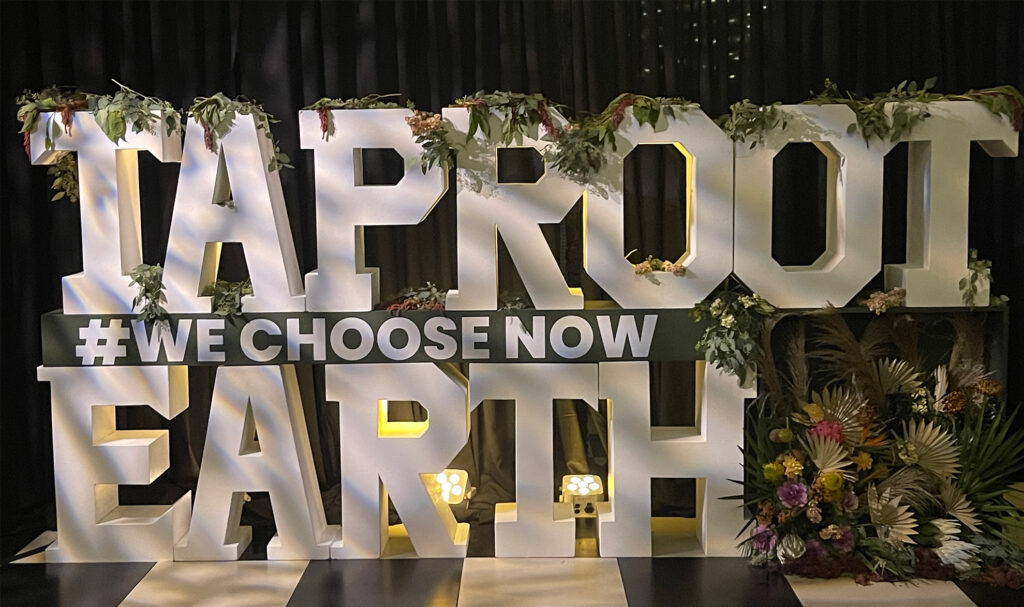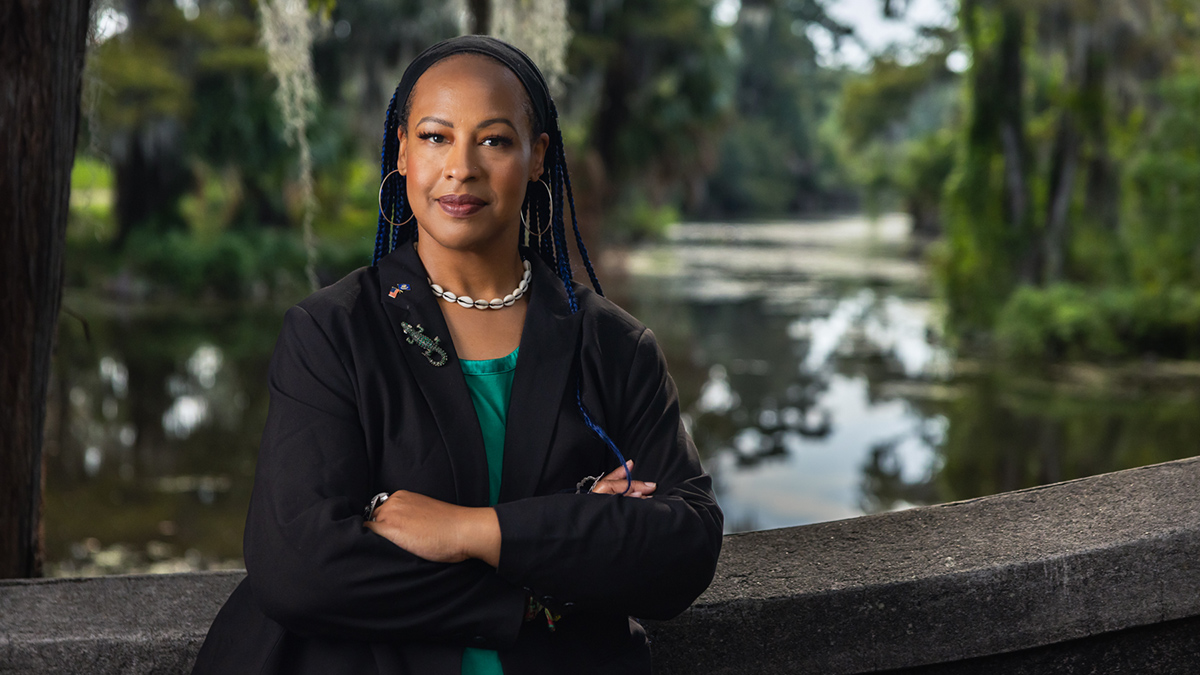“Let’s Get Behind the Frontlines” with Colette Pichon Battle
Award-winning lawyer and climate justice organizer Colette Pichon Battle shares her bold vision for Taproot Earth, a new bioregional frontline organizing project designed to model radical democratic climate action. She shares what inspired her to become a lawyer, how her legal work is rooted in her community and her traditions, and how the law is limited when it comes to justice.
Colette spoke with Bioneers Senior Producer Stephanie Welch about her work at the 2024 Bioneers Conference.
Music: “Watching Pieces Move” – Nagamo
Transcript
For some people, the climate justice work is a career choice. For others of us, this is about our life, our livelihood, and for me it’s about my traditions and the communities that I come from.
I was my grandmother’s caregiver, and so I was always around a lot of old people, I was always around them. You know, my job was to read a lot. I had to read the scriptures out loud or read the instructions out loud. There was an understanding of your role and how respect could be shown through service, not servitude, right, but service; how listening was more important than talking. And these are things that I learned very, very young, mostly because traditionally that is the role of the child, right, to definitely be in the room but not necessarily to be the main voice.
And I have to say I was also in rooms where if I ever wanted to voice my opinion, I was allowed to. But wisdom was the response. Right? So if I have something to contribute, I also have to be ready to receive what wisdom has to give back to you. Right? So it’s not “Let me make a point,” it’s “Let me make a contribution,” and if my contribution isn’t yet mature, let me receive what wisdom has to offer. I think about that all the time.
I was just talking earlier today about, you know, me and my attitude, and I always had an opinion, and enough for your community to say, “You should be a lawyer,” as opposed to “be quiet and sit down, little girl.” You know? They see you, and they see that you’ve come with something. Right? God has given you something—courage, a voice, a quick mind. We know what to use that for. You should be a lawyer. And I think many people in my community would tell you, yeah, she’s been that the whole time.
But there were two lawyers that stood out for me. One was Thurgood Marshall. So as I learned about the Civil Rights movement, as I learned about people fighting for their rights, and I learned about who was a lawyer in the Civil Rights movement, it’s Thurgood Marshall. It’s a Supreme Court justice. It’s rising to this occasion. It’s standing up and articulating and advocating for our community to have equal rights under the law. And that felt right. It felt noble. It felt good. And I was like, yes, I want to be that; I can do that.
The other person that stands out is Clair Huxtable. So you have to know that—I remember, it was a really big deal with The Cosby Show came to primetime. I’m in that generation where like on Thursdays at 7:00, everybody got around the TV to watch The Cosby Show. And there was this beautiful Black woman who had children, a family, joy. She was smart, she was so beautiful to me. And she was a lawyer. And I said, oh, well, you know, she’s cuter than Thurgood Marshall, for sure, so that’s clearly what I am—I’m a Thurgood Marshall/Clair Huxtable wannabe.
And so, for me, it was—I want to be everything that I know I can be—a Black woman with an education and a family that they love, and someone who’s fighting for our society and for us to have equal rights. That feels good; I’ll go there.
And that’s what I had in my head. And, of course, when you go to law school, especially as a Black person from the South, the opportunity is that you’ve made it to a professional class. You must now go earn a six-figure salary, work for a corporation, and it doesn’t matter who you defend or fight for so long as you can say you work at a firm, wear a nice suit, have a good house, and have a nice car. And that wasn’t enough. I was disenchanted with the law the first year of law school, and realized this has nothing to do with justice. In fact, I remember understanding law as a very formulaic and methodical practice. And like I said, it’ll teach you; it’s a great teacher. There’s a formula to law. That’s how a judge can say yes or no to a thing. You know? A B = C. If it’s not A or B, then it doesn’t equal C, like it is that formulaic. I should be—It is. It’s taught that way. But that’s rarely justice. Justice is in between those. Justice is invisible sometimes. Justice is unspoken or unproven, but it doesn’t make it untrue, and it doesn’t make it unreal.
And so fighting for this broader notion, not just of what man has thought to write down, but to understand inherent laws, and natural laws. You know? That’s what I love about Bioneers. This is the first place I really heard people leaning into the rights of nature.
So my understanding of the laws has grown. And now I think about how to be the type of lawyer that is rooted in poetry and mystical understanding of invisible things, and faith, and belief in the best parts of humanity, and hope. These are not things you learn in law school. These are things you learn organizing at the community level. These are things you learn, can’t possibly have been written down. You can’t possibly write down the rights you have in the aftermath of Hurricane Katrina. Nobody can imagine that. But we had rights in the aftermath of Hurricane Katrina, and they weren’t articulated anywhere, because they never had to be. The law is necessarily reactive to something that we’ve experienced. It’s rarely, you know, pro-actively ready for what we haven’t gotten. We’re seeing that now with AI and climate. The laws are way behind. Right?
So you realize law follows the human experience, and you have to really engage in the human experience to understand your role as a lawyer, to ensure that the structures and laws that come from it allow justice to continue to grow, allow for things to be addressed, yes, but for justice to grow, and perhaps even repair.
The beginning of this work was so full of sadness and anger, and disbelief, and confusion. And all I had at that time was my law degree, my legal background, my very school-based understanding of what the law and the government and governance was supposed to be, and so it was just a really limited way of thinking about the world and the responses to a disaster like Katrina. And it was one dimensional. Effective, but one dimensional.
I think over the years, and we’re at 19 years since Katrina this year—it’ll be 19 years—I think over the years it has come to be multi-dimensional. Emotionally, anger is not—it’s not a sustainable emotion. It’ll hurt you or someone else if you try to just move in that. And I don’t come from anger. I come from joy. I come from the Bayou community that’s really full of joy and life and livelihood. And so to evolve out of anger into more joy, gratitude, possibility, abundance, resistance, that has been a place where I think I’ve evolved, at least in my approach.

And the legal work is not the beginning. It’s not the top. It’s not the tip of the spear, it’s wind for wings that are much broader than just a legal approach. The legal approach is a tactic, but organizing and building power at the community level is the win, and that’s what I’ve really learned.
So I think my growth has been to understand that, at best, we are learning one-dimensional ways of living on the planet and advancing our profession. Coming into movement work, you learn there are many dimensions of being, and many ways of intersecting on purpose, and if you can shift from anger into something a lot more regenerative, like love and abundance, you can start to create inside of these moments of resistance. Right? You don’t just have to tear down. You can actually get to some of the answers that we’re all looking for.
So it’s been a tough trajectory. You know, you don’t just move to that place. You have to get to that place, but I’m really grateful to be in a more steady, stable place, rooted in love that I come from, rooted in joy that I come from, but still very committed to advancing a resistance toward a broader liberation for everyone.
I’m so proud to talk about Taproot Earth. It is a new organization, and it began last year in 2023, with a seven-year time horizon. So we are moving until 2030. And we’re moving until 2030 as an organization, because 2030 is the point of no return, so says the International Climate Scientists. Once we get to 2030, if we haven’t made significant reductions in greenhouse gases, the way we live on the planet will be dramatically changed—mass migrations, because it’ll be too hot or too cold somewhere; extreme weather events at a rate that no one can really respond to. This is what’s going to happen if we don’t reduce our greenhouse gas emissions by 2030.
Taproot came on the scene specifically to be an actor inside of that timeline.
1) we want to be a weapon for the climate justice movement. But 2) we want to actually experiment and show the possibility of impermanence.
You know, sometimes we take these sort of colonized ways of being— Institution-building is necessary but not for everybody. Some of us need to be able to move around and dissipate. Right? Some of us need to be able to do hard things and then go to the next level.
And so Taproot Earth is such an organization. We’re strange. I am the partner for vision and initiatives. My strategy partner is Anthony Giancatarino, and he and I have been working together for over a decade, really thinking through this climate crisis.

So our work is really to build formations that can govern themselves, and to build those formations from the frontlines upward. We focus on the Gulf South, which is Texas, Louisiana, Mississippi, Alabama, Florida, and Puerto Rico. We share a water, and so that is how we—we use, some might call it a bioregion, we call it watershed organizing. Take off those borders and think about the natural systems that we share. We share that gulf. We share those waters. We share the realities of a particular history in the South.
We also focus on Appalachia, which brings us into not just the Ohio River Valley but into the sort of Appalachia mountain chain, but all the states that touch that—the Carolinas, some of the Georgia south, of course, Kentucky, Pennsylvania—it takes us into Pennsylvania—West Virginia. And, again, we’re working in these areas that are the energy sources for this country. So oil and gas and coal is the Gulf South and Appalachia.
And we also work in the Black diaspora, and we define the Black diaspora as any place where Africans were and were taken from and brought in the Transatlantic slave trade. And so we work absolutely on the African continent, but also in the U.K., Canada, the U.S., the Caribbean, Latin America, South America. These are places where Black folks are, and that’s where we want to do our work.
And so building formations, both domestically in the U.S., but also globally. We have our global Black climate leaders network. It’s called Taproot Noir, and it is all Black from the Black diaspora.
We have a Gulf South to Appalachia formation that runs those 17 states, and it’s all frontline people who are coming together to say we understand what’s happening and we have solutions. We’re not an organization focused on, you know, tearing down or dismantling the system, although we are in deep solidarity and support for those organizations whose job that is. We want to be ready with some solutions, and we want to be ready with not just ideas, but actually piloted projects, [LAUGHS] that come from the frontline, so that when someone has the audacity to tell us that they understand what we’re saying but there’s no proof that we can make change, we say we have the proof. And we are starting to really show that in the world. And I’m really excited about that.
We are pushing a billion-dollar refund by 2030, to get a billion dollars to the ground to the Black diaspora, governed by the frontlines. And we’re really hoping that folks will join us, not just to make individual donations, which we love and we want, and thank you, but to hold some of the largest systems accountable—the Church, the Crown, the corporations who are responsible for so many of these imbalances that we’re seeing.
And so we’re going big. The vision is large. It’s taking a lot of courage. We’re building a team. Our team is global, and I’m really excited about it. But at the end of the day, we are headquartered in the great state of Louisiana. We have a role to play in a global conversation. And we’re taking on the fossil fuel industry as a main culprit in this fight. And we have a responsibility to the world to hold this industry accountable.
So we’ve got a just transition lawyering network, and that lawyering network works in the U.S., and it’s specifically to flank the climate frontlines. It’s lawyers who know we ought to be doing something. They know there’s something that we can offer in our legal system, but they just don’t know what to do. And the answer is not to let the lawyers lead, the answer is to connect the lawyers to the community and get behind what the community wants to do. So the just transition lawyering network is doing that.
We’re building these formations that govern themselves. And in seven years, when we finish, they will stand on their own. You know, Lord willing, they will stand on their own. And maybe they won’t. You know? We’re trying things. We’re having some courage. We’re trying new ways of being, but we’re putting some solutions out there so that folks can stop saying we understand but we don’t know what to do; we understand but there’s nothing we can change. Taproot Earth wants to be able to say: Here are the models, and they’re coming from the frontlines. And they always were. And they always can. So let’s put our investment, our time, our energy there, and let’s get behind the frontlines.

